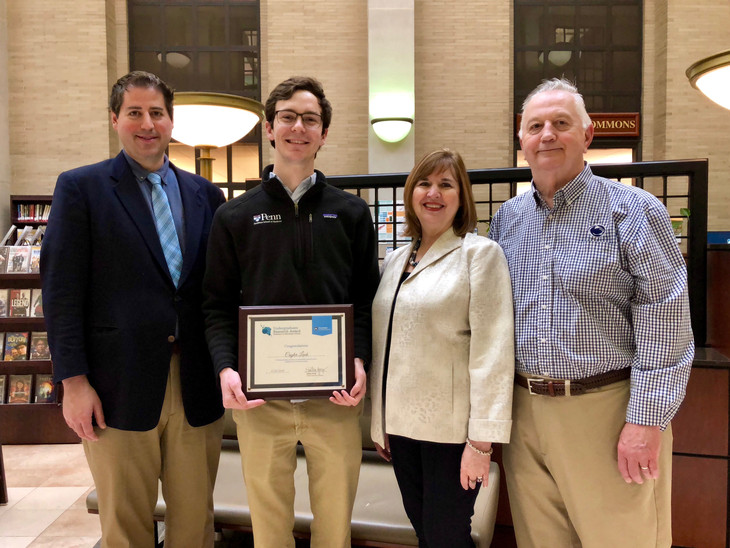
Cuyler Luck, a Junior majoring in Microbiology, earned the John Sr. and Kimlyn Patishnock Grand Prize at the Undergraduate Research Exhibition. Luck, one of sixty Biochemistry and Molecular Biology students presenting research at the event, impressed the judges with his research on “Identifying Drug-Drug Interactions Between Experimental Antimalarians.” Along with a certificate, Luck was awarded a cash prize of $500.
Since his freshman year, Luck has been doing undergraduate research in the laboratory of Prof. Manuel Llinás. Luck had developed an early interest in life science, particularly in infectious disease, and was looking for an opportunity to practice the skills he was learning in the classroom in a laboratory setting. “I enjoy solving problems and so working in a lab, particularly in the context of malaria and helping people, was really appealing to me”, stated Luck.
Malaria is one of the most devastating diseases worldwide causing over 1.5 million deaths and afflicting over 300 million people annually, with most being children under the age of 5. In 2016 malaria was responsible for 216 million cases and resulted in 445,000 deaths worldwide. The biggest issue in the fight against malaria is that while there are effective frontline antimalarials, resistance has arisen to every treatment that available and continues to spread.
The Llinás lab works on the deadliest form of the parasite, Plasmodium falciparum. Since all current antimalarial treatments are comprised of combination therapies (2 drugs), Luck’s research strives to identify new combinations of antimalarials which interact with one another. In particular, he is searching for drugs which either augment or inhibit another drugs activity when used together. Identifying drugs that augment one another allows for the clearing of parasites even with low dosages of drugs. In contrast, drugs that inhibit one another and work against each other poses a direct threat to patients.
A unique challenge Luck faces is that it is almost impossible to predict whether any two antimalarial drugs will interact with each other and how. Combination therapies are particularly effective when the component drugs target different aspects of the parasite's metabolism. These therapies make it much more difficult for the parasite to develop resistance to the treatment, as there are multiple different adaptations that the parasite would have to evolve in order to survive. The challenge is that, even if the two drugs have different targets, it is never clear how they may interact with one another on a metabolic level. Even the best example of a synergistic antimalarial pair currently used in the field, Malarone (a combination of Atovaquone & Proguanil), which was discovered by accident while exploring Cycloguanil, the metabolic derivative of Proguanil.
Luck’s research moving forward will consist of testing combinations of antimalarials together in hopes of identifying a promising combination. In-depth followup analysis on these interactions will also be performed using mass spectrometry-based metabolomic experiments established in the Llinás lab. He will continue to work with known pairs of antimalarials which are synergistic and antagonistic in order to better define anticipated metabolic changes associated with synergistic or antagonistic pairs of drugs.
This results of Lucks research could inform future antimalarial drug rollouts by informing which drugs should be used together in the field. Luck’s ultimate goal is to be able to assist in the identification of a new regimen of drugs which, when used in combination, could help save the lives of malaria patients around the world.
After graduation Luck plans to attend graduate school and earn his Ph.D. in cancer biology. To help further his undergraduate career and prepare for his future he will be spending this summer, his second in the program, at the Summer Undergraduate Internship Program at the University of Pennsylvania researching breast cancer tumor recurrence. Combining his love for science with his passion for teaching, Luck’s goal is to one day conduct research as well as teach as a professor in academia.
